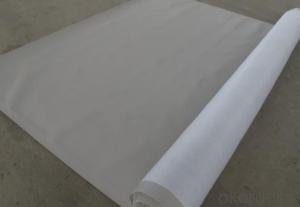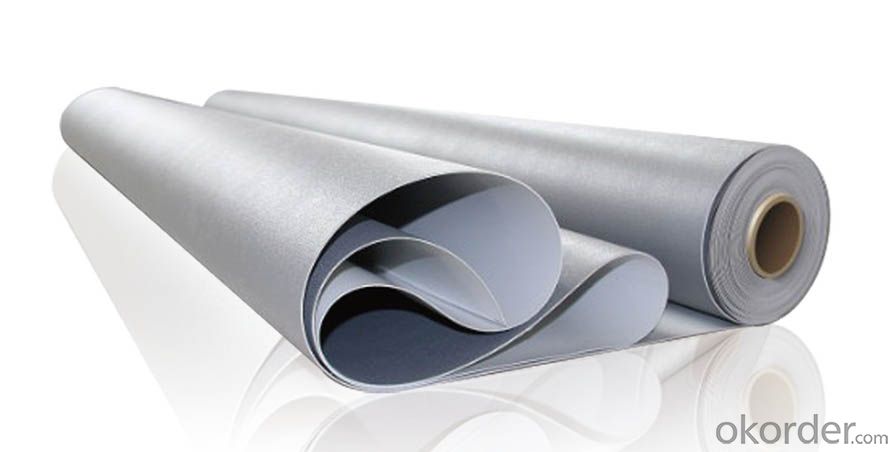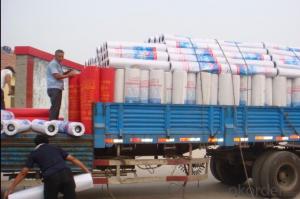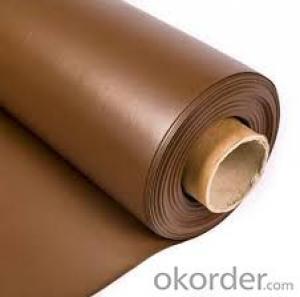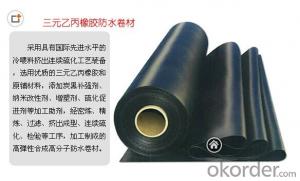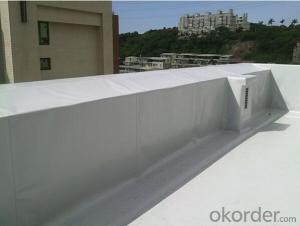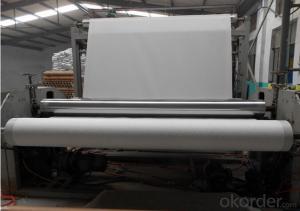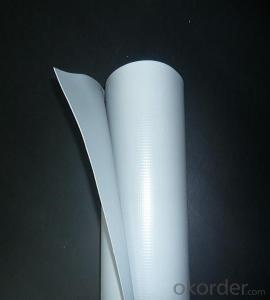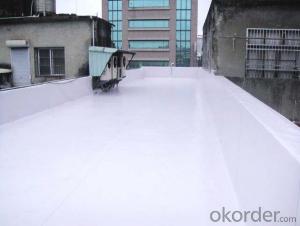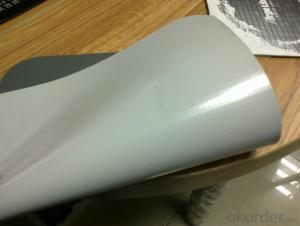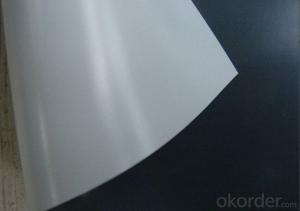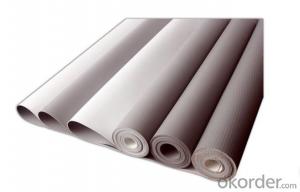Polyvinyl Chloride (PVC) Waterproofing Membrane
- Loading Port:
- China main port
- Payment Terms:
- TT OR LC
- Min Order Qty:
- 5000 m²
- Supply Capability:
- 100000 m²/month
OKorder Service Pledge
OKorder Financial Service
You Might Also Like
1. Introduction of PVC Waterproofing Membrane
Polyvinyl Chloride (PVC) waterproof membrane is a new polymer waterproof membrane which is made from polyvinyl chloride resin, and mixed with plasticizer, filler, antioxygen, ultraviolet absorber and other auxiliaries.
2. Features of PVC Waterproofing Membrane
1) Excellent aging resistance. Service life of roofing material is over 20 years;
service life of underground material is over 50 years.
2) Root resistant penetration, specially used on planting roof.
3) Welding installation. Joints are solid and environment friendly, no pollution.
4) High tensile strength, good elongation and dimensional stability.
5) Good plasticity, easy and suitable for details installation.
6) Fireproof. Fire extinguished out of the ignition resource.
7) Surface is smooth, no fading and dirty resistant.
3. Specification of PVC Waterproofing Membrane
Length | 20m/roll or customized |
Width | 2.05m |
Thickness | 1.2mm; 1.5mm; 2.0mm |
Type | Homogeneous, Reinforced, Fabric back |
If Exposed | Exposed and Non-exposed |
Color | White, Grey or customized |
4. Applications of PVC Waterproofing Membrane
1) All kinds of roofs, such as steel structure roof, planted roof etc.
2) Underground engineering, such as building basement, subways, tunnels, air raid shelter, etc.
3) Other projects like artificial lake, dam, water reservoir, grain storehouse, etc.
5. FAQ of PVC Waterproofing Membrane
a.Can we get some samples before place order?
Answer: We can send the free samples to you by freight collect.
b.How many years can your PVC membrane guarantee?
Answer: We will guarantee the quality for 5 years at least.
c.Which countries you ever export the product?
Answer: We export the PVC membrane to South Africa, Middle east and even European countries.
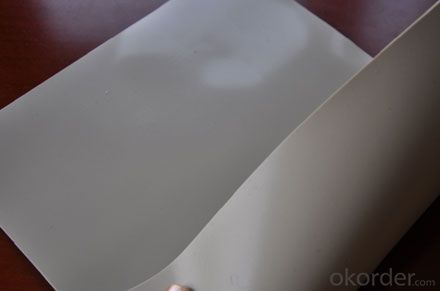
- Q: The shortcomings of polypropylene waterproofing, and the shortcomings of modified asphalt waterproofing membrane
- The advantages of the membrane waterproof, such as: the construction is convenient, the construction period is short, not need to be cured after forming, is not affected by the temperature, the environmental pollution is small, the layer thickness is easy to hold and hold the fortification meter, the material is calculated accurately, the site management is convenient, Cut corners, even thick layer, empty shop can effectively overcome the grass-roots stress (effective in the grass-roots cracks to maintain the overall waterproof layer).
- Q: Can a waterproofing membrane be used on fiberglass surfaces?
- Yes, a waterproofing membrane can be used on fiberglass surfaces. Fiberglass is a non-porous material, which means it does not absorb or retain water. However, it is still susceptible to water damage if not properly protected. Applying a waterproofing membrane on fiberglass surfaces creates an additional barrier that prevents water from seeping into the material and causing damage. This can be particularly important in areas such as bathrooms, showers, or swimming pools, where fiberglass is commonly used. The waterproofing membrane acts as a protective layer, ensuring that the fiberglass remains dry and preventing any potential water-related issues such as leaks, mold, or deterioration.
- Q: Can a waterproofing membrane be used on brick walls?
- Yes, a waterproofing membrane can be used on brick walls. It helps to prevent water penetration and protects the bricks from moisture damage.
- Q: Can waterproofing membranes be used on utility manholes?
- Yes, waterproofing membranes can be used on utility manholes. Waterproofing membranes are specifically designed to provide a barrier against water infiltration, making them suitable for use in areas where water is present, such as manholes. These membranes are typically applied to the walls and floors of the manhole to prevent water from seeping through and causing damage to the structure or the utilities within. By effectively sealing off the manhole, waterproofing membranes help to maintain the integrity and functionality of the utilities and prevent water-related issues such as corrosion, leaks, and the degradation of materials. Additionally, waterproofing membranes can also provide protection against other elements such as chemicals, gases, and soil contaminants that may be present in or around the manhole. Therefore, using waterproofing membranes on utility manholes is a common practice to ensure their long-term durability and functionality.
- Q: Can a waterproofing membrane be used for bridge decks and roadways?
- Yes, a waterproofing membrane can be used for bridge decks and roadways. Waterproofing membranes are designed to provide a protective layer that prevents water infiltration, which is essential for the long-term durability and performance of bridge decks and roadways. These membranes help to prevent water damage, such as corrosion and cracking, and also protect the underlying structure from moisture-related issues.
- Q: Can a waterproofing membrane be used for plaza decks?
- Plaza decks necessitate safeguarding against water infiltration to avoid harm to the underlying structure. This is where the application of a waterproofing membrane comes into play. These membranes are specifically designed to create a barrier, preventing water from permeating the deck and causing issues like leaks, deterioration, and structural damage. Typically composed of materials such as bitumen, rubber, or polyurethane, these membranes boast high resistance against water penetration. By incorporating a waterproofing membrane onto a plaza deck, it ensures the deck remains impervious to water, thereby preserving the integrity of the entire structure. Furthermore, these membranes offer additional advantages such as UV resistance, durability, and easy maintenance, rendering them an ideal solution for plaza decks.
- Q: Can a waterproofing membrane be used for schools or universities?
- Yes, a waterproofing membrane can definitely be used for schools or universities. These membranes are designed to provide protection against water damage, preventing leaks and moisture intrusion in buildings. By installing a waterproofing membrane, schools and universities can ensure the longevity of their structures, protect valuable assets, and maintain a safe and comfortable environment for students and faculty.
- Q: Can a waterproofing membrane be used in hospitals or healthcare facilities?
- Waterproofing membranes have the ability to be utilized in hospitals and healthcare facilities. In reality, it is highly advisable to employ waterproofing membranes in these settings as it is crucial to maintain a clean and hygienic environment. Typically, waterproofing membranes are applied on floors, walls, and ceilings to prohibit the infiltration of water or moisture. This infiltration can result in the growth of mold, the deterioration of building materials, and the compromise of the facility's structural integrity. By utilizing waterproofing membranes, healthcare facilities can effectively shield against water damage, facilitate easier cleaning and maintenance, and prevent the growth of harmful microorganisms and bacteria. Furthermore, waterproofing membranes can also assist in managing moisture levels, thereby reducing the risk of slips and falls. This reduction in risk is particularly vital in areas frequently visited by patients, staff, and visitors. Overall, waterproofing membranes are an invaluable asset in ensuring the safety, durability, and cleanliness of hospitals and healthcare facilities.
- Q: Are waterproofing membranes resistant to root penetration?
- Yes, waterproofing membranes are generally resistant to root penetration. These membranes are specifically designed to prevent water from penetrating through the surface and into the underlying structure. In addition to their water resistance, they also possess qualities that make them resistant to root penetration. This is important in areas where vegetation or trees may be present, as roots have the potential to grow and penetrate through various surfaces, causing damage and compromising the integrity of the waterproofing system. Waterproofing membranes are typically made from materials that are tough and durable, providing a barrier that roots cannot easily penetrate. However, it is important to note that no waterproofing membrane is completely immune to root penetration, as some root systems may be particularly aggressive or invasive. In these cases, additional measures such as root barriers or specialized membranes may be necessary to ensure long-term protection against root penetration.
- Q: What are the advantages and disadvantages of waterproofing membrane?
- The advantages of the membrane waterproof, such as: the construction is convenient, the construction period is short, not need to be cured after forming, is not affected by the temperature, the environmental pollution is small, the layer thickness is easy to hold and hold the fortification meter, the material is calculated accurately, the site management is convenient, jerry, a uniform layer thickness, the base layer can effectively overcome stress empty shop (the base layer occurs at the time maintaining the overall efficiency of large cracks waterproof layer).
Send your message to us
Polyvinyl Chloride (PVC) Waterproofing Membrane
- Loading Port:
- China main port
- Payment Terms:
- TT OR LC
- Min Order Qty:
- 5000 m²
- Supply Capability:
- 100000 m²/month
OKorder Service Pledge
OKorder Financial Service
Similar products
Hot products
Hot Searches
Related keywords
